Plastic Pollution is Killing Us.
- Terra Water Indonesia

- Jun 23, 2023
- 1 min read
The world's plastic pollution crisis as explained by National Geographic

Much of the planet is swimming in discarded plastic, which is harming animal and possibly human health. Can it be cleaned up?
The world is currently overwhelmed with rapidly increasing production of disposable plastic products, and the ability to deal with them is limited. Plastic pollution is most visible in developing Asian and African nations, where garbage collection systems are often inefficient or nonexistent. However, the developed world, especially in countries with low recycling rates, also have trouble properly collecting discarded plastics. The problem is so severe that it has prompted efforts to write a global treaty negotiated by the United Nations.
Plastic pollution is having a negative impact on our oceans, wildlife health and even human health. In Bali, Terra works with partners like Sungai Watch, Trash Hero and Plastic Exchange to stop pollution from entering our waterways in a big way. And then other partners like PunchCo, Potato Head, and Ibuku to make conscious decisions when it pertains to lifestyle and spending. All of these decisions happen at the SOURCE, which means we can keep plastic out of our water in the first place. We know that plastic does eventually make its way into our water though. But, lucky for us, Terra filters eliminate the need for water in plastic bottles at all, and when we do use existing water for drinking, cleaning or feeding animals and babies, they also eliminate most microplastics so we can feel good about our own health.

To read the full article about The Worlds Plastic Pollution Crisis Explained by our friends at National Geographic, click here.



Comments